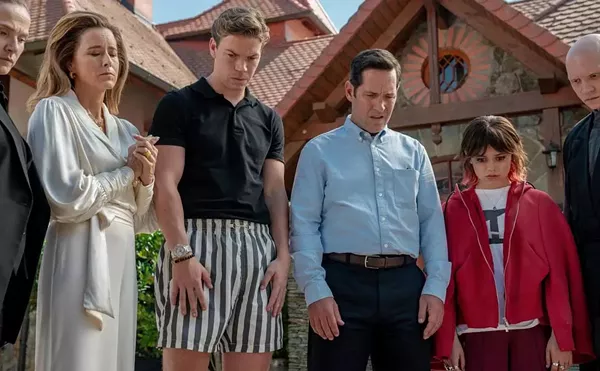For the grown-ups, there seems little else to do except drink. It’s a hot summer on a beachfront in New Zealand; Kate (Sarah Pierse) and her husband, Ed (Alistair Browning), sit in lounge chairs in front of their rented cottage, a supply of liquor and ice at hand, and sip their way through the day. Often, in the evenings, there’s a party at their place with other boozy adults, dancing to the oldies, playing cards, being social. And then there are the blinding hangovers in the morning, then back to the lounge chairs.
Of course, not all drinkers are the same and Kate seems to be the more desperate of the two — bored with her vacation, her marriage, her life — while Ed, despite his permanent air of distraction (from his close proximity to his wife’s dissatisfaction), gives the general impression of being a fairly simple bloke who likes a good buzz.
Kate and Ed have their two young children with them, 13-year-old Janey (Alicia Fulford-Wierzbicki) and her brother, Jim (Aaron Murphy), who looks to be about 8 or 9. Janey is on the cusp of adolescence, attractive in an unconventional sort of way (like her mother), but with her budding sexuality still obscured by residual baby fat. She is going through an observant phase, not yet having plunged into the teenage black hole of self-absorption. Janey’s a spy in her parents’ house of discontent, watching with disapproval her mother’s dissipation and, with more indulgence, her father’s out-of-it loopiness. Meanwhile, young Jim is pretty much oblivious to the family’s slow-motion disintegration and seems its only happy member. This is almost sad to see, since you know that in a few years, in this family, he’s bound to begin to turn surly and rebellious, and that he’ll have to suffer before he finds his own life, if he ever does.
This nearly static arrangement begins to inch more decisively toward a crisis with the appearance of Cady (Martin Csokas), a handsome photographer who lives on a nearby fishing boat. Cady sparks interest first in the mother and then, after Janey catches the two in a hot clinch, the daughter. No doubt a part of Janey’s interest is competitive, a desire to take something away from her hated mother. But it’s also the next step for someone who has grown bored with a local would-be boyfriend slightly younger than her, whom she tortures by randomly kissing, causing him to run away in embarrassment. (“Why did you do that?” asks Jim. “To scare him,” she replies.)
Rain is the feature debut of writer-director Christine Jeffs, her adaptation of a novel by Kristy Gunn, and it’s as visually assured as it is dramatically sluggish. Jeffs is very good at conveying the torpor of this particular New Zealand summer. There are recurring shots of the family’s sun-baked summer home at the beginning of yet another stillborn day, of the seemingly endless supply of amber fluid being languidly sloshed onto the melting ice cubes, and of that other temporary salvation, the cooling ocean. It’s a mood piece with a slow accretion of character detail being favored over more linear plotting.
The “persons under 18 will not be admitted” warning that the DFT has posted for this film is a little puzzling. The one sequence that could possibly disturb minors — an inevitable encounter between Cady and Janey — is so discretely handled that one has to assume that what one expects to happen does, in fact, happen. Maybe it’s the subject matter. Or maybe I just don’t know what 17-year-olds should be protected from these days.
The movie’s subdued mood is shattered by a rather devastating ending, which would be more effective if it didn’t seem as though Janey were being too harshly punished for her having responded to the pull of her natural curiosity. One is reminded of the fierce morality of those slasher films where the more sexually active kids are the ones who meet the most gruesome fate (though nobody is slashed here and Janey isn’t killed). Or, if that’s too much interpretation, then the ending seems to arise from a desire to add a decisive punctuation mark to the free-form paragraphs that preceded it. Either way, it’s not good — though the movie, as a whole, is.
Showing exclusively at the Detroit Film Theatre (inside the DIA, 5200 Woodward Ave., Detroit), Friday-Sunday. Call 313-833-3237.
Richard C. Walls writes about film for Metro Times. E-mail him at [email protected].





